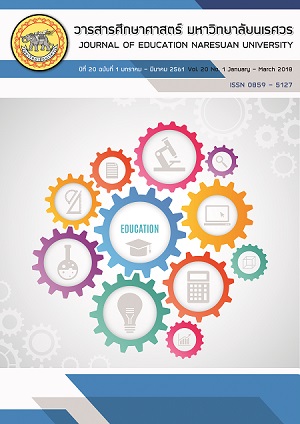การพัฒนาหลักสูตรพัฒนาครูโดยใช้การโค้ชเชิงบวก เพื่อพัฒนาหลักสูตรการบริโภคสื่ออย่างรู้เท่าทัน ตามหลักปรัชญาของเศรษฐกิจพอเพียง; THE DEVELOPMENT OF TEACHER PROFESSIONAL DEVELOPMENT CURRICULUM USING POSITIVE COACHING TO CONSTRUCT CURRICULUM FOR MEADIA...
Main Article Content
Abstract
การวิจัยนี้มีวัตถุประสงค์เพื่อ 1) สร้างและตรวจสอบคุณภาพของหลักสูตรพัฒนาครู 2) ทดลองใช้หลักสูตรพัฒนาครู และ 3) ศึกษาปัจจัยความสำเร็จของการโค้ชเชิงบวก การเก็บรวบรวมข้อมูลใช้วิธีการผสมผสานทั้งเชิงปริมาณและเชิงคุณภาพ โดยใช้เครื่องมือวิจัย ได้แก่ แบบทดสอบ แบบประเมินการปฏิบัติงาน แบบประเมินคุณภาพของหลักสูตร เครื่องเก็บรวบรวมข้อมูลเชิงคุณภาพ ได้แก่ แบบบันทึกอนุทินการเรียนรู้ จดหมายขอบคุณ แบบสัมภาษณ์ และการสนทนากลุ่ม โดยทดลองใช้กับครูทุกคนใน 1 โรงเรียน จำนวน 15 คน เป็นครูผู้สอนระดับชั้นประถมศึกษาและมัธยมศึกษา โดยใช้การเลือกแบบเจาะจง (Purposive Sampling) ใช้เวลาทดลองใช้ 9 สัปดาห์ ผลการวิจัย พบว่า หลักสูตรพัฒนาครูมีความเหมาะสมมากทั้ง 8 องค์ประกอบ การพัฒนาครูโดยใช้การโค้ชเชิงบวก 5 ขั้นตอน ได้แก่ ขั้นตอนที่ 1 สร้างมิตรภาพและแรงจูงใจในการเปลี่ยนแปลง ขั้นตอนที่ 2 ตั้งเป้าหมายที่ท้าทายอย่างสมดุลและชัดเจน ขั้นตอนที่ 3 วางแผนและให้คำมั่นสัญญา ขั้นตอนที่ 4 ลงมือปฏิบัติและประเมินสู่เป้าหมายที่ท้าทายอย่างไหลลื่น ขั้นตอนที่ 5 ถอดบทเรียน ต่อยอดและภูมิใจในความสำเร็จ ทำให้ครูมีความรู้เกี่ยวกับการพัฒนาหลักสูตรหลังการทดลองใช้หลักสูตร สูงกว่าก่อนการทดลองใช้หลักสูตร อย่างมีนัยสำคัญทางสถิติที่ระดับ .01 และเมื่อเปรียบเทียบเกณฑ์ หลังการทดลองใช้ สูงกว่าเกณฑ์ร้อยละ 75 อย่างมีนัยสำคัญทางสถิติที่ระดับ .01 มีความสามารถในการปฏิบัติงานพัฒนาหลักสูตรในระดับมาก และครูสามารถสร้างหลักสูตรรายวิชาเพิ่มเติมได้ คนละ 1 หลักสูตร รวม 15 หลักสูตร ภายใต้ประเด็นการบริโภคสื่ออย่างรู้เท่าทัน ตามหลักปรัชญาของเศรษฐกิจพอเพียง ในภาพรวมหลักสูตรมีความเหมาะสมมาก รวมทั้งครูมีเจตคติที่ดีต่อการพัฒนาหลักสูตร ปัจจัยความสำเร็จของการโค้ชเชิงบวก ได้แก่ โค้ช ครูผู้รับการโค้ช เพื่อนร่วมงาน สื่อและแหล่งเรียนรู้ที่ใช้ในการพัฒนาครู ผู้บริหารโรงเรียน กระบวนการโค้ช รวมทั้งการจัดบรรยากาศที่เอื้อต่อการทำงาน และความสัมพันธ์อันดีระหว่างโค้ชและผู้รับการโค้ช
THE DEVELOPMENT OF TEACHER PROFESSIONAL DEVELOPMENT CURRICULUM USING POSITIVE COACHING TO CONSTRUCT CURRICULUM FOR MEADIA CONSUMPTION WITH MEADIA LITERACY BASED ON THE SUFFICIENCY ECONOMY
The purposes of this study were to construct, approve and implement the teacher professional development curriculum and to study the key success factors of the positive coaching. The collected data were both quantitative and qualitative. Research instruments; were the test, practice assessment form, assessment of the curriculum, attitude test, learning journal, thank you letter to coach, interview form and focus group interview and school administrator interview form. Curriculum implementation with fifteen teachers in one school. As results, the quality of the teacher professional development curriculum there were eight components; were appropriate at a high level, 5 step of positive coaching; Step 1: Start up the rapport and generate the motivation for changing. Step 2: Set the goal: challenged, balanced and clear. Step 3: Planning and making a commitment. Step 4: Action and goal evaluation, and Step 5: After Action Review, Top-up, and Self-respecting. The knowledge of the teachers on curriculum development after learning was higher than before, and was higher than the 75 percent criterion at the level of significance of .01, competency of curriculum development and teachers were able to construct supplementary curriculum each in term of media consumption with media literacy base on the sufficiency economy, total 15 curriculum and quality of which teachers constructed by themselves were appropriate at a high level and teachers had positive attitude towards curriculum development. Key success factors of positive coaching were; functional factor; coach, coachee, colleague, materials and resources used in the development of teachers and school administrator and good working environment, good relationship between coach and coachee.
Article Details
The owner of the article does not copy or violate any of its copyright. If any copyright infringement occurs or prosecution, in any case, the Editorial Board is not involved in all the rights to the owner of the article to be performed.
References
Biggins, O. (2011). Developing media literacy in Thai style. In Media literacy: Articles of concepts, theories, and experience in media literacy. (pp. 141-151). Bangkok: Offset Creation. (in Thai)
Blamey, K. L., Meyer, Carla K. and Walpole, S. (2009). Middle and High School Literacy Coaches: A National Survey. Journal of Adolescent & Adult Literacy, 52(4), 310-323.
Diener, R. B., & Dean, B. (2007). Positive Psychology Coaching. Hoboken: John Wiley & Sons.
Hicks, R. F. (2014). Coaching as a leadership Style: The Art and Science of Coaching Conversations for Healthcare Professionals. New York: Routledge.
Knight, J. (2007). Instructional Coaching: A Partnership Approach to improving Instruction: Thousand Oaks: Corwin Press.
Knowles, M. (1984). The adult learner: A neglected species (3rd ed.). Houston: Gulf Publishing.
Moomark, M., Onthanee, A., Kaewurai, W., & Rinjalean, A. (2016). A curriculum development to enhance classroom action research competency with knowledge management network for teachers. Journal of Education Naresuan University, 18(1), 1-9. (in Thai)
Nugultham, K., Hansapiromchoke, P., Kakaew, J., Chanpen, P., & Piromkam, B. (2011). The study of the needs for teachers’ training in the central west region (Research report). Nakhon Pathom: Kasetsart University Kamphaengsaen Campus. (in Thai)
Office of the Education Council. (2009). Research and development on a school-based model for developing teachers and school administrators in small size schools phase I. Bangkok: Prikwarn Graphic. (in Thai)
Office of the Education Council. (2010). A research report: Research and development of teachers and education personnels professional development policies. Bangkok: Prikwarn Graphic. (in Thai)
Office of the National Economic and Social Development Board. (2011). The eleventh national economic and social development plan (2012 - 2016). Bangkok: Sahamitr Printing & Publishing. (in Thai)
Santawee, K. (2010). Media exposure and media literacy of youths in bangkok (Research report). Bangkok: Rajamangala University of Technology Phra Nakhon. (in Thai)
Sitkuntod, W. (2008). Development of a causal model of media literacy of ninth grade students in schools under the office of the basic education commission in Bangkok metropolis (Master thesis). Bangkok: Chulalongkorn University. (in Thai)
Snyder, C. R., & Lopez, S. J. (2007). Handbook of Positive psychology. Oxford: Oxford University Press.
Taba, H. (1962). Curriculum Development: Theory and Practice. New York: Hartcourt Brance and World.
Tyler, R. W. (1969). Basic Principles of Curriculum and Instruction (29th ed.). Chicago: The University of Chicago Press.
Valerio, A. M., & Lee R. J. (2005). Executive coaching: a guide for the HR professional. San Francisco: John Wiley & Sons.
Wattanathorn, A. (2007). KM and research for developing a local curriculum. Bangkok: The Thailand Research Fund (TRF). (in Thai)
Whattananarong, K. (2009). Techniques for developing learning motives. Journal of Technical Education Development King Monkut's University Of Technology North Bangkok, 21(71), 6-23. (in Thai)
Yopp, D., et al. (2011). How to be a Wise Consumer of Coaching. Feature Coaching. 32(1), 50-53.


